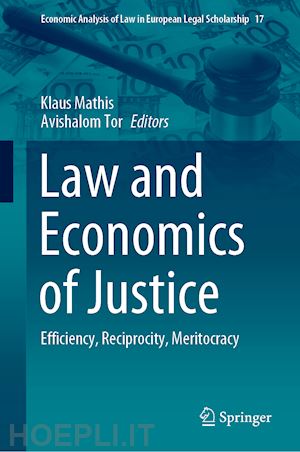

Questo prodotto usufruisce delle SPEDIZIONI GRATIS
selezionando l'opzione Corriere Veloce in fase di ordine.
Pagabile anche con Carta della cultura giovani e del merito, 18App Bonus Cultura e Carta del Docente
While previous volumes have examined specific issues and developments such as the coronavirus crisis or digital transformation from a law and economics perspective, the anniversary edition returns to the methodological and philosophical fundament of the discipline of law and economics. The present book aims to examine these foundations in general and, in particular, efficiency, reciprocity and meritocracy, and their relation to law and justice from an interdisciplinary perspective.
Efficiency: Traditionally, the economic analysis of law has been guided by the goal of efficiency. Economists usually define efficiency as Pareto or Kaldor–Hicks efficiency. Any change that makes one member of society better off without anyone else being worse off is a Pareto improvement. A change is a Kaldor–Hicks improvement if the gainers value their gains more than the losers value their losses, with only hypothetical compensation required.
Reciprocity: Economists have traditionally basedtheir models on the self-interest hypothesis of homo oeconomicus. In this model, an individual maximises his own utility without being altruistic or jealous. Behavioural economics challenges the self-interest hypothesis. In fact, many people deviate from purely self-interested behaviour. There are also signs that considerations of fairness and mutual benefit are important in bilateral negotiations and in the functioning of markets.
Meritocracy: The concept of meritocracy refers to a system, organisation, or society in which people are selected and promoted to positions of success, power, and influence on the basis of their abilities and merits. This means that an individual is able to climb the social ladder through hard work. Moreover, meritocracy directs the most talented people into the most functionally important positions, thereby increasing a society's efficiency. However, the equalising function of meritocracy has been criticised. Rather than reducing inequality, meritocracy is seen as the cause of racial, economic and social inequality.
Klaus Mathis is Full Professor of Public Law, Law of the Sustainable Economy, and Philosophy of Law at the University of Lucerne. He is Director of the International Network for Law and Economics—lucernaforum, Director of the Institute for Interdisciplinary Legal Studies—lucernaiuris, and Director of the Centre for Law and Sustainability (CLS). His particular fields of expertise are Swiss Constitutional Law, Law and Economics, Law of Sustainable Development, and Philosophy of Law.
Avishalom Tor is Professor of Law and Director of the Notre Dame Research Program on Law and Market Behavior (ND LAMB). His particular fields of expertise are Behavioural Law and Economics, Antitrust Law, and Behavioural Decision Research.











Il sito utilizza cookie ed altri strumenti di tracciamento che raccolgono informazioni dal dispositivo dell’utente. Oltre ai cookie tecnici ed analitici aggregati, strettamente necessari per il funzionamento di questo sito web, previo consenso dell’utente possono essere installati cookie di profilazione e marketing e cookie dei social media. Cliccando su “Accetto tutti i cookie” saranno attivate tutte le categorie di cookie. Per accettare solo deterninate categorie di cookie, cliccare invece su “Impostazioni cookie”. Chiudendo il banner o continuando a navigare saranno installati solo cookie tecnici. Per maggiori dettagli, consultare la Cookie Policy.